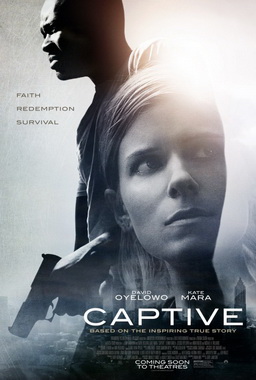Faith-based true story sparks interesting Q&A
Faith-based film has been making a comeback in theaters recently, and Captive is the latest project here to capitalize on the so-called “lucrative faith-based market.” Based on the true story of Ashley Smith as written in her book Unlikely Angel, the film follows Ashley, portrayed by House of Cards’ Kate Mara, who is addicted to meth and has lost custody of her young daughter, as she’s kidnapped and held hostage by Brian Nichols (Selma’s David Oyelowo), a convict on the run from police. It’s a harrowing story told well and chock full of good performances.
We got the opportunity to sit in on a Q&A at the New York premiere of the film at the newly opened Sheen Center, featuring Oyelowo, Mara, and Mrs. Nichols, Brian’s mother, moderated by Gayle King. Check out the Q&A below.
King: There was something about this project that drew you in. What was it?
Oyelowo: What drew me in was Ashley, really. For me personally, the idea of playing someone who did what Bryan did doesn’t make me jump out of bed every morning and say that’s what I want to do necessarily, but the effect that this event had on Ashley and her life drew me in. Yes, Brin did what he did, but Ashley was also in a terrible state at this point in terms of being held captive to meth; she’d lost custody of her daughter at that point and was on a downward spiral as well. The fact that some good came out of this dire, dire situation meant a lot. I’m a firm believer of light shining the brightest in the darkness, and if I have to play the dark element in order to show that light, that was a sacrifice I felt that I was willing to make.
King: [Kate] What’s it like for you to be playing a character who’s still alive? Most of the time as an actress, unless you’re playing a true story, it’s a character on a page; you don’t meet them or interact with them physically. Is it harder to play that kind of role?
Mara: Yea, because I’ve been in true stories before where I’ve never met the person I was gonna play. It feels more intimidating and the pressure feels a little more high.
King: Did you two meet?
Mara: We did, but as soon as I met Ashley, I felt relieved. We’d been emailing each other back and forth a few times, but when we started shooting, I went to her family’s house and we spent the day together.
Smith: Yup. Kate called and said “I’m coming over,” so me and my aunt had to get a meal together, although we didn’t know Kate was vegan, so…(laughs)
Mara: I had a feeling, but I just didn’t want them to know.
Oyelowo: It happens everywhere she goes.
Mara: Not at your house, David. (laughs)
Oyelowo: That’s because I know! (laughs).
King: So you brought over your own food, but why did you go over there? Did you want a better sense of her story and her mannerisms?
Mara: I knew how supportive she was already of telling her story, and I had done everything else, so it was my decision to embrace her and embody her as fully as I possibly could.
King: What does it feel like playing someone who says they have a demon living inside them?
Oyelowo: Part of it is acting, but when it comes to the spiritual side of life there’s an exchange. There’s no way you’re going to these places emotionally and it not having an effect on you. [Ashley] and I had talked about [Brian] for a while while on set; he killed 4 people in a day, so how did you gain that? What has happened to a spirit that’s caused something this huge to happen to them? As I tried to place myself into these kinds of places, it was harrowing and exhausting, and as incredible a role as this was, I was relieved when it was all said and done…To a lesser degree when you’re playing a role like this, you can’t really shake it. You can’t just go home and say “Alright, let’s watch Desperate Housewives.” You’re kind of in the zone for a time…You need to talk to Jessica, my wife, about me being in the zone, but like I said before, that’s the price to pay, but ultimately, it was about the exchange of humanity. At no point, did I feel comfortable with the idea of excusing what Brian did; I wasn’t exonerating him because there are a lot of people whose lives are broken from that day…even though we’re making a movie, out of respect for them you don’t want it to feel like you’re tying it up in a nice bow in the end because their lives are still broken, but you also can’t get away from the fact that fugue state that [Bryan] was in after he killed those people and meeting with [Ashley], I think you showed him a humanity that had defused this human time bomb he’d become, and that’s why I was drawn here.
“Captive” in now playing.
